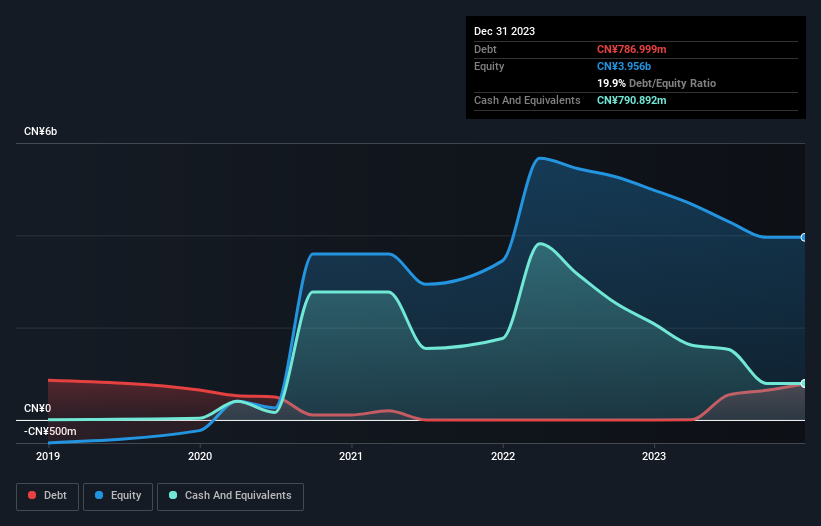
Legendary fund manager Li Lu (who Charlie Munger backed) once said, 'The biggest investment risk is not the volatility of prices, but whether you will suffer a permanent loss of capital.' So it seems the smart money knows that debt - which is usually involved in bankruptcies - is a very important factor, when you assess how risky a company is. We note that RemeGen Co., Ltd. (HKG:9995) does have debt on its balance sheet. But the real question is whether this debt is making the company risky.
When Is Debt A Problem?
Debt is a tool to help businesses grow, but if a business is incapable of paying off its lenders, then it exists at their mercy. Ultimately, if the company can't fulfill its legal obligations to repay debt, shareholders could walk away with nothing. However, a more usual (but still expensive) situation is where a company must dilute shareholders at a cheap share price simply to get debt under control. Of course, debt can be an important tool in businesses, particularly capital heavy businesses. The first step when considering a company's debt levels is to consider its cash and debt together.
See our latest analysis for RemeGen
What Is RemeGen's Debt?
The image below, which you can click on for greater detail, shows that at September 2023 RemeGen had debt of CN¥787.0m, up from none in one year. However, its balance sheet shows it holds CN¥790.9m in cash, so it actually has CN¥3.89m net cash.

A Look At RemeGen's Liabilities
We can see from the most recent balance sheet that RemeGen had liabilities of CN¥794.8m falling due within a year, and liabilities of CN¥763.3m due beyond that. Offsetting this, it had CN¥790.9m in cash and CN¥441.7m in receivables that were due within 12 months. So its liabilities outweigh the sum of its cash and (near-term) receivables by CN¥325.5m.
Having regard to RemeGen's size, it seems that its liquid assets are well balanced with its total liabilities. So while it's hard to imagine that the CN¥23.8b company is struggling for cash, we still think it's worth monitoring its balance sheet. While it does have liabilities worth noting, RemeGen also has more cash than debt, so we're pretty confident it can manage its debt safely. The balance sheet is clearly the area to focus on when you are analysing debt. But ultimately the future profitability of the business will decide if RemeGen can strengthen its balance sheet over time. So if you're focused on the future you can check out this free report showing analyst profit forecasts.
Over 12 months, RemeGen reported revenue of CN¥1.1b, which is a gain of 41%, although it did not report any earnings before interest and tax. With any luck the company will be able to grow its way to profitability.
So How Risky Is RemeGen?
By their very nature companies that are losing money are more risky than those with a long history of profitability. And the fact is that over the last twelve months RemeGen lost money at the earnings before interest and tax (EBIT) line. Indeed, in that time it burnt through CN¥2.2b of cash and made a loss of CN¥1.5b. With only CN¥3.89m on the balance sheet, it would appear that its going to need to raise capital again soon. With very solid revenue growth in the last year, RemeGen may be on a path to profitability. Pre-profit companies are often risky, but they can also offer great rewards. There's no doubt that we learn most about debt from the balance sheet. But ultimately, every company can contain risks that exist outside of the balance sheet. We've identified 2 warning signs with RemeGen , and understanding them should be part of your investment process.
When all is said and done, sometimes its easier to focus on companies that don't even need debt. Readers can access a list of growth stocks with zero net debt 100% free, right now.
New: AI Stock Screener & Alerts
Our new AI Stock Screener scans the market every day to uncover opportunities.
• Dividend Powerhouses (3%+ Yield)
• Undervalued Small Caps with Insider Buying
• High growth Tech and AI Companies
Or build your own from over 50 metrics.
Have feedback on this article? Concerned about the content? Get in touch with us directly. Alternatively, email editorial-team (at) simplywallst.com.
This article by Simply Wall St is general in nature. We provide commentary based on historical data and analyst forecasts only using an unbiased methodology and our articles are not intended to be financial advice. It does not constitute a recommendation to buy or sell any stock, and does not take account of your objectives, or your financial situation. We aim to bring you long-term focused analysis driven by fundamental data. Note that our analysis may not factor in the latest price-sensitive company announcements or qualitative material. Simply Wall St has no position in any stocks mentioned.
About SEHK:9995
RemeGen
A biopharmaceutical company, engages in the discovery, development, and commercialization of biologics for the treatment of autoimmune, oncology, and ophthalmic diseases with unmet medical needs in Mainland China and the United States.
Exceptional growth potential with mediocre balance sheet.
Market Insights
Community Narratives



